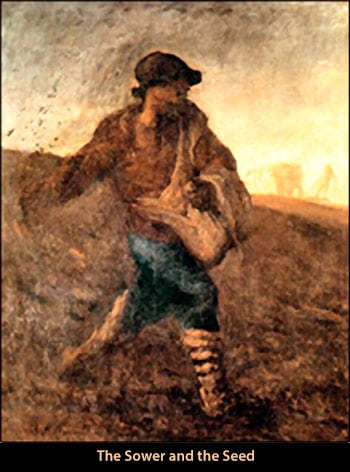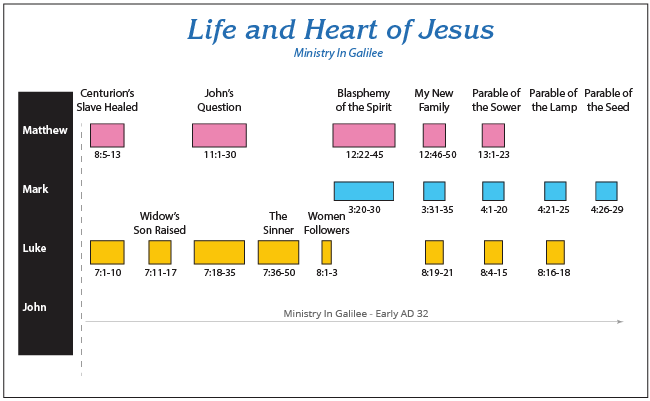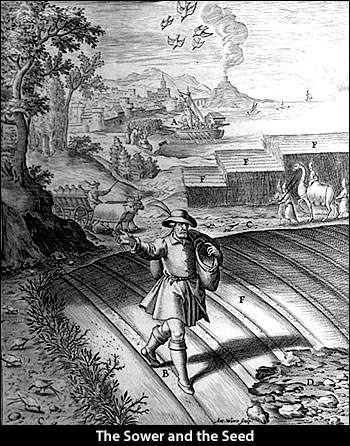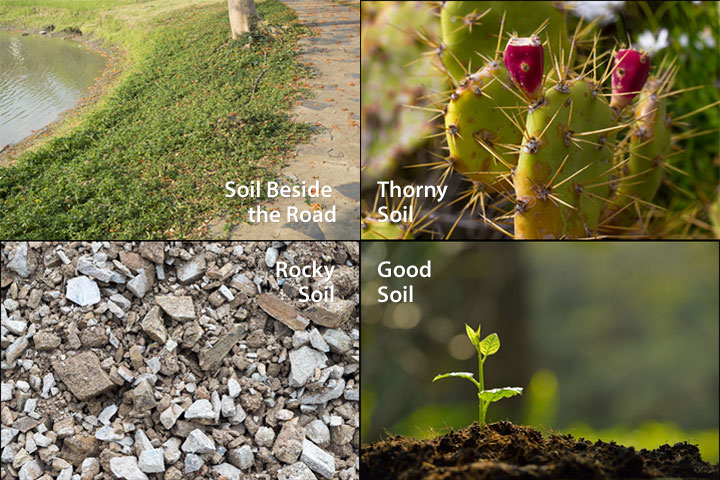Do you think that a person can believe in Jesus Christ and then some day leave the faith, even reject Jesus, and still be a Christian? What does it mean that someone accepts or believes in Jesus Christ? There is confusion today about the characteristics of a true Christian. Some believe that a person becomes a Christian with a prayer. The following question is not unusual, “He prayed to receive Jesus Christ when he was in his twenties. He no longer attends church, but I just know that he is a Christian. Isn’t he?” This study (Matthew 13:1-23; Mark 4:1-20; Luke 8:4-15) will answer this question as we examine Jesus’ parable of the “Sower and the Seed.” This was the first of Jesus’ kingdom parables. It is foundational because it reveals the true identity of the citizens of the kingdom.
Day In Jesus’ Life
The events of the last two studies and the preaching of the kingdom parables all occurred in one day of Jesus’ life. It must have been a long day for Jesus. He must have been very tired and weary from His confrontation with the religious leaders. At the end of the last study, Jesus’ family had just arrived. As we start this study, Jesus leaves the house and sits down on the seashore of the Sea of Galilee. Most likely His family followed Him and they had some time together. But His break from the people did not last long, as we discover in our first two verses.
That day Jesus went out of the house and was sitting by the sea. And large crowds gathered to Him, so He got into a boat and sat down, and the whole crowd was standing on the beach.” Matthew 13:1-2 (NASB)
Mark 4:1 adds that the crowd was very large. So Jesus got into a boat and sat down, just as the Jewish rabbis did when they taught. The large crowd stood on the beach in order to listen to Him. Then Jesus started presenting His parables.
Parable Of The Sower
The gospel of Matthew says that Jesus presented many parables to the large crowd. Yet, the Holy Spirit only recorded a small number of them. The most significant of the parables is the parable of the sower and the seed. It is also the first recorded parable.
And He spoke many things to them in parables, saying, “Behold, the sower went out to sow; and as he sowed, some seeds fell beside the road, and the birds came and ate them up. Others fell on the rocky places, where they did not have much soil; and immediately they sprang up, because they had no depth of soil. But when the sun had risen, they were scorched; and because they had no root, they withered away. Others fell among the thorns, and the thorns came up and choked them out. And others fell on the good soil and yielded a crop, some a hundredfold, some sixty, and some thirty. He who has ears, let him hear.” Matthew 13:3-9 (NASB)
The parable was simple. It was about a sower who scattered seed as he walked. Some of the seed fell along his path, some fell beside the path or on rocks, among thorns and thistles, among weeds, and some fell on good soil. As expected, only the seed that fell on the good soil grew to produce a harvest. That was the end of the parable. Jesus did not explain its meaning to the crowd.

Why Speak In Parables?
Matthew and Mark tell us that as soon as Jesus and the twelve disciples were alone, the disciples asked, “Why do you speak to the people in parables?”
As soon as He was alone, His followers, along with the twelve, began asking Him about the parables. Mark 4:10 (NASB)
And the disciples came and said to Him, “Why do You speak to them in parables?” Matthew 13:10 (NASB)
The disciples did not understand why Jesus did not clearly explain the parables. How were the people expected to understand the message of the parable? Jesus’ answer was direct and maybe shocking.
Jesus answered them, “To you it has been granted to know the mysteries of the kingdom of heaven, but to them it has not been granted.” Matthew 13:11 (NASB)
The disciples could know the meaning of the parable but not the crowds. Mark 4:11 adds “those who are outside get everything in parables.” That is, those who are excluded from the kingdom, those who do not believe in Jesus Christ cannot know or understand the parable.
Why were they excluded? The answer to the question is given in Jesus’ next statement.
“For whoever has, to him more shall be given, and he will have an abundance; but whoever does not have, even what he has shall be taken away from him. Therefore I speak to them in parables; because while seeing they do not see, and while hearing they do not hear, nor do they understand.” Matthew 13:12-13 (NASB)
The first part of Jesus’ answer, Matthew 13:12, reveals that the crowd had a spiritual problem and that there is an established spiritual principle which grants more information to those who already have spiritual understanding and insight. That is, those who are not part of God’s spiritual family will eventually lose what little spiritual understanding they do have. It is like those who work hard. Usually, the more you work, the more you obtain in this life. Those who do not work eventually have very little and may lose what little they do have. In the spiritual realm, those who have a deeper relationship with God will grow even more. Those who do not have a relationship will become even further separated from God.
The second part of Jesus’ answer, Matthew 13:13, becomes personal, “. . . while seeing they do not see, and while hearing they do not hear, nor do they understand.” He now refers to the crowd directly. That is, after hearing Him teach on previous occasions, the crowd still could not understand spiritual truth. They could not understand because they were not spiritually alive.
1 Corinthians 2:14 reminds us that the natural man, or a person who does not have a spiritual relationship with God, cannot understand spiritual truth.
But a natural man does not accept the things of the Spirit of God, for they are foolishness to him; and he cannot understand them, because they are spiritually appraised. 1 Corinthians 2:14 (NASB)
Spiritual truth is foolishness to those who are not spiritually alive. They do not have any ability to understand it. Therefore, we should not be surprised that some seminary graduates and pastors have strange views about the teaching of the Bible and do not believe or accept some important truths. Seminary does not make a man spiritual. There are pastors who are not spiritually alive and yet they confidently teach the Bible. The Jewish religious leaders of Jesus’ day were just one example.
Then Jesus quoted the prophet Isaiah as further explanation,
In their case the prophecy of Isaiah is being fulfilled, which says,
“You will keep on hearing, but will not understand;
You will keep on seeing, but will not perceive;
For the heart of this people has become dull,
With their ears they scarcely hear,
And they have closed their eyes,
Otherwise they would see with their eyes,
Hear with their ears,
And understand with their heart and return,
And I would heal them.” Matthew 13:14-15 (NASB)
Did you notice that the prophecy predicted “the heart of this people has become dull?” That is, they had already rejected Jesus Christ. They had already heard about Jesus and heard His message. They came primarily to see Him perform miracles, to do wonders, to be healed, but the unbelieving crowd had rejected Him along with His teaching. Without spiritual life, they could not see; they could not hear nor understand. Therefore, Jesus spoke to them in parables.

Why should Jesus explain the parable? They were not spiritual because they did not believe in Jesus Christ. They had rejected the light (John 16:7-11) that God has given them.
But the disciples were different. They were already part of Jesus’ spiritual family. They believed in Him. Then Jesus added,
But blessed are your eyes, because they see; and your ears, because they hear. For truly I say to you that many prophets and righteous men desired to see what you see, and did not see it, and to hear what you hear, and did not hear it. Matthew 13:16-17 (NASB)
The Old Testament saints and prophets had longed to know about Jesus and to see Him. They would have loved to have been present. Even the holy angels had longed to know more about Jesus (1 Peter 1:10-12). The disciples were privileged. They could see with their eyes, hear with their ears, and touch the Son of God. They were spiritually alive and therefore Jesus would teach them just as the Holy Spirit does today.
Some Strange Views
Some teachers and pastors have said that the message of the parable is that we must avoid being unfruitful since true believers are to be fruitful. Others claim that the meaning of the parable is that reaping must be delayed in order to allow many people to come to God. Still some say that the parable seeks to teach us that the Word of God is not generally welcome by unbelievers. Another says that despite all the difficulties, the kingdom of heaven is expanding. These differences of views are not alternate or acceptable interpretations of the parable. They miss the meaning of the passage.
Parable Explained
What is the real meaning of the parable? Jesus starts the explanation with this,
Hear then the parable of the sower. Matthew 13:18 (NASB)
Who is the sower of the seed? Is it Jesus? Is it you? The first clue is found in Luke 8:11 where we are told that the seed is the Word of God. Matthew 13:19 reveals also that the seed is the word of the kingdom. This means that the Word of God is the message of the kingdom. The second clue is found in Matthew 13:3-4 where we are reminded the sower sows seed. That is, the sower gives out the Word of God. The third clue is found in 1 Corinthians 3:6-8 where the Holy Spirit tells us that we are the ones who plant or sow the seed (the Word of God), and it is God who gives the increase. That is, He has called us to be sowers of the seed. He has not called us to make seed or to make anyone become a follower of Jesus or to grow spiritually. He only asks us to faithfully sow seed. We are responsible only for scattering seed. It is God the Holy Spirit who brings the increase.
Romans 10:15 and 17 tells us that people must hear the Word of God in order to believe in Jesus Christ.
How will they preach unless they are sent? Just as it is written, “How beautiful are the feet of those who bring good news of good things! . . . So faith comes from hearing, and hearing by the word of Christ.” Romans 10:15, 17 (NASB)
The sower is anyone who follows Jesus and faithfully teaches or preaches the Word of God, that is, the Bible. If you are a follower of Jesus Christ, are you a good sower of the seed? Are you faithfully spreading the message of the Word of God about Jesus Christ? There are those who do not know that Jesus died for their sins. There are those who do not know that their sins can be forgiven by simply accepting Jesus’ claim that He is God and believing in Him. God has given His followers the privilege of sowing seed. Do you want to sow seed?
Seed Beside The Road
Jesus’ parable is about four different soils: soil beside the road, soil containing rocks, soil among thorns, and good soil. Each soil represents a different type of person. Together, all of the soils represent the hearts and minds of every living person.
Here is His explanation of the seed that fell onto the soil next to the road,
When anyone hears the word of the kingdom and does not understand it, the evil one comes and snatches away what has been sown in his heart. This is the one on whom seed was sown beside the road. Matthew 13:18-19 (NASB)
We have already discovered that the seed is the Word of God. Therefore according to Jesus’ explanation, persons whose hearts are like this soil do not understand the Word of God. According to Luke 8:12, they do not understand because the evil one (Matthew 13:19), Satan (Mark 4:15), or the devil (Luke 8:12), snatches away the Word of God. Luke 8:12 adds that consequently they do not believe and are not saved.
This soil represents anyone who hears the Word of God and does not understand because of the activity of the evil one. The evil one creates confusion by creating doubts about God (Genesis 3: 2-5), presenting intellectual arguments (1 Corinthians 1:18; 2 Corinthians 2:11), and introducing the teachings of alternative religions or different paths to God (2 Corinthians 11:14; 1 Timothy 4:1). Satan will do anything he can to cause a person to reject the truth of the Word of God. He is evil.

Seed On Rocky Soil
Then Jesus explained the second soil.
The one on whom seed was sown on the rocky places, this is the man who hears the word and immediately receives it with joy; yet he has no firm root in himself, but is only temporary, and when affliction or persecution arises because of the word, immediately he falls away. Matthew 13:20-21 (NASB)
This person hears the Word of God and at first is excited and happy about what he or she hears. Luke 8:13 says that the person believes for a while but eventually stops believing because of temptations to sin. Matthew 13:21 adds that affliction and persecution also motivate this person to stop believing. Together Matthew and Luke give us the complete picture. Persecution and affliction can motivate a person to respond incorrectly. That is, persecution and affliction will tempt a person to take an incorrect course of action and not respond to God.
Some years ago a woman was attending a women’s Bible study in order to learn more about God. She soon realized that the members of her family had a different view of God. They had a different faith. She started responding to the truth she was hearing, and a spiritual battle occurred within her about believing in Jesus. She strongly felt that what she was hearing was true but eventually decided not to believe in Jesus and give herself to Him because she was uncomfortable with the truth that loved ones who never believe in Jesus will go to hell. The fear of persecution and rejection tempted her to reject Jesus and she did. She is just one example of seed cast among the rocks. Lord willing, she may eventually believe and follow Him. We can only pray.
Mark 4:17 alerts us to the fact that some will respond to what they hear, but their response is “only temporary.” How long is temporary? We do not know, but it is clear that they do not continue. Eventually, they leave the faith.

Seed Among The Thorns
Jesus’ third soil contains thorns.
And the one on whom seed was sown among the thorns, this is the man who hears the word, and the worry of the world and the deceitfulness of wealth choke the word, and it becomes unfruitful. Matthew 13:22 (NASB)
A person whose heart is like this soil hears the Word of God but due to anxiety or distress about issues in the world or concerns over money, eventually rejects Jesus. The Greek word that is translated as “worry” is merimna. It refers to a feeling of apprehension or distress. This person starts to worry about events in life or financial needs and eventually leaves Jesus Christ. This person may not intentionally ignore Jesus Christ, but does. He or she becomes preoccupied with issues in daily life, work, home, family, or even church and never believes in Jesus. A person can attend church but never believe in Jesus and never be saved from the penalty of sin.
I have often shared the true story about a man who considered himself to be a Christian. One day he told me that he was very disappointed with God because he thought that God would make him wealthy if he followed Jesus. He had missed the point that God does not forgive our sins and promise that we will become wealthy. God’s purpose is not to make everyone rich. God’s primary goal is to forgive our sins. This man had it wrong. The deceitfulness of wealth had caught him. God wants those who believe in Jesus Christ to follow Him.
Seed On Good Soil
The last part of the parable is about seed that fell on good soil.
And the one on whom seed was sown on the good soil, this is the man who hears the word and understands it; who indeed bears fruit and brings forth, some a hundredfold, some sixty, and some thirty. Matthew 13:23 (NASB)
The good soil represents a person who hears the Word of God, believes, and is saved. Luke 8:15 explains that this soil has an “honest and good heart.” It believes and holds fast. It perseveres or continues believing. This person understands the Word of God and does not pull away from God because of affliction or persecution, wealth, or the worries and cares of life.
Luke 8:15 makes it clear that this person believes that Jesus is God and continues believing throughout earthly life. He or she never stops believing. He or she bears fruit for God. The other soils never produced fruit. This is the only soil that produced spiritual fruit. Fruit is symbolic of spiritual growth and effective ministry for God. Galatians 5:22-23 tells us that the Holy Spirit produces the fruit of the Spirit in the life of believers.
But the fruit of the Spirit is love, joy, peace, patience, kindness, goodness, faithfulness, gentleness, self-control . . . Galatians 5:22-23 (NASB)
This type of fruit will be growing in one who is really a follower of Jesus. Faith comes by hearing the Word of God. Then the Word of God produces a miraculous work in the lives of those who really belong to God.
So faith comes from hearing, and hearing by the word of Christ. Romans 10:17 (NASB)
For this reason we also constantly thank God that when you received the word of God which you heard from us, you accepted it not as the word of men, but for what it really is, the word of God, which also performs its work in you who believe. 1 Thessalonians 2:13 (NASB)
The result is spiritual fruit. Romans 1:13 tells us that Christians can bear fruit by bringing others to Jesus Christ, and Ephesians 5:9 reveals that fruit includes godliness,
. . . for the fruit of the Light consists in all goodness and righteousness and truth . . . Ephesians 5:9 (NASB)
The true follower of God will bear different types of spiritual fruit.
Conclusion
The four soils reveal that people have rejected and will reject Jesus Christ for different reasons. At first some may respond, be happy, and rejoice; but if they are not true followers of Jesus Christ, they will eventually walk away. They will never produce any fruit. The following verse explains why someone may appear to be a Christian or a follower of Jesus Christ, but yet not be real,
They went out from us, but they were not really of us; for if they had been of us, they would have remained with us; but they went out, so that it would be shown that they all are not of us. 1 John 2:19 (NASB)
The four soils illustrate this truth. The four soils also illustrate how real followers of Jesus Christ continue believing and never stop. It is an error to conclude that just because someone claims to have believed Jesus was God, died for his or her sins and was willing for God to take control of his or her life, does not mean that he or she did or was serious. The ultimate proof comes later when he or she either stops believing and leaves the faith or continues. Real Christians continue in the faith.
The true marks of a follower of God are found later in the desires of the heart, the quest for a godly life, and one’s manner of conduct. The fruit of the life proves everything. Some day each and everyone of us will stand before God. Some will go into eternal life and some to eternal punishment (Matthew 25:46). Jesus will review the deeds we have performed or the fruit of our lives. There is no escape. True believers not only believe what Jesus claimed about Himself. Jesus taught that He was God, died for our sins, and returned to life. True faith also willingly submits to Him.
. . . if you confess with your mouth Jesus as Lord, and believe in your heart that God raised Him from the dead, you will be saved . . . Romans 10:9 (NASB)
Which kind of soil are you? The soil beside the road, the soil among the rocks, the soil with thorns, or the good soil?
Suggested Links:
Is Hell A Real Place?Jesus Taught In Parables
Is someone a Christian if they practice unrepentant sin?
What does it mean to receive Christ?
What things usually keep people from turning their lives over to Jesus?